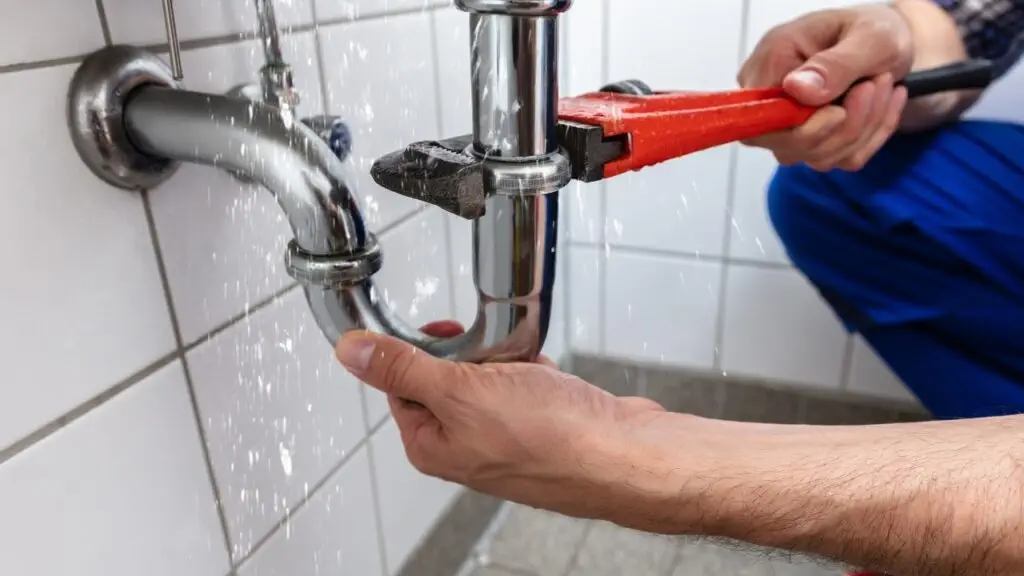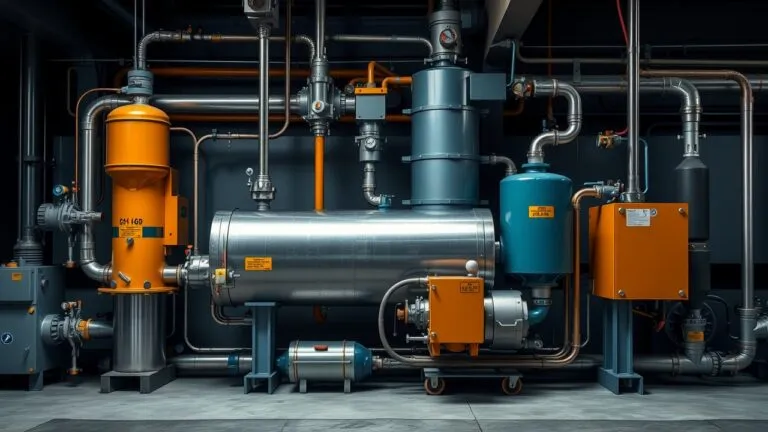Different types of plumbers specialize in residential, commercial, or specialized areas. Choosing the right one depends on your specific plumbing needs.
What Are the Different Types of Plumbers?

Plumbing is a skilled trade. It helps keep our homes and businesses working well. Plumbers install, fix, and take care of systems that move water, gas, and waste. Knowing the different types of plumbers is key for homeowners and businesses when they need help.
There are several types of plumbers:
- Residential Plumbers: These experts focus on home plumbing. They fix leaks, install sinks or toilets, and make sure drains work right.
- Commercial Plumbers: These plumbers work on bigger projects in businesses. They handle complex piping systems that follow specific codes and rules.
- Industrial Plumbers: These pros work in factories or large buildings. They deal with heavy machinery and high-pressure plumbing.
- Service Plumbers: They come out for repairs or maintenance at homes and businesses. Their skills help them find problems fast.
- Repair Plumbers: Their job is to fix issues like broken pipes or faulty appliances, not installing new things.
- Installation Plumbers: These specialists put in new plumbing systems during building projects or renovations.
Knowing these plumber specialties can help you maintain your home or business better. Choosing the right plumber saves time and prevents costly mistakes down the road.
The Value of Specialized Knowledge in Plumbing
Specialized knowledge boosts service quality in plumbing. Licensed plumbers go through training to learn their trade. They know local codes, safety rules, materials used in plumbing, and how to troubleshoot problems based on their specialty.
Some key roles include:
- Residential plumber
- Commercial plumber
- Drain cleaning specialist
- Gas fitter
Each role needs special skills gained through education and experience—helping clients get reliable service that fits their needs.
Common Scenarios Requiring Different Types of Plumbers
Homeowners or businesses may face various situations needing different plumbing services:
- Emergency Repairs: When leaks happen at night, an emergency plumber can help right away.
- Drain Cleaning Services: If a drain gets clogged, a drain cleaner uses special tools to clear it fast.
- Gas Fitting Needs: When you install new gas appliances like stoves, a licensed gas fitter makes sure it’s safe.
Knowing which plumber to call for your specific needs helps keep your plumbing system running smoothly while avoiding expensive errors later on.
What Services Do Residential Plumbers Offer?
Residential plumbers are experts in home plumbing systems. They make sure everything works well, and they can help with many tasks. Here are some common services that residential plumbers provide:
- Fixing Leaky Faucets: Dripping faucets waste water and can increase bills.
- Clearing Clogged Drains: If sinks or tubs don’t drain well, plumbers can solve the problem.
- Repairing Burst Pipes: When pipes burst, it can cause big messes. Plumbers fix this fast to avoid damage.
- Installing New Fixtures: Plumbers install toilets, sinks, and more to improve your home.
Besides these repairs, residential plumbers also handle installations for important appliances like water heaters and garbage disposals. They know local building codes, which helps ensure all work meets safety standards.
When Should You Call a Residential Plumber?
There are times when you need to call a residential plumber right away:
- Water Leaks: Look for signs of leaks in pipes or around fixtures. Don’t wait!
- Clogged Drains: If you can’t clear a clog yourself, it’s time for a pro.
- Low Water Pressure: A sudden drop in water pressure could mean trouble.
- Sewer Backups: This is serious! Call licensed professionals immediately if you experience this.
Recognizing these situations helps homeowners keep their properties safe and avoid costly damages from ignoring repairs or installations.
Commercial vs Industrial Plumbing Services Compared
What Does a Commercial Plumber Handle?
Commercial plumbers work in many places like offices, restaurants, hotels, and stores. They know how to manage plumbing systems that are much more complex than what you find in homes.
In these commercial spaces, issues can pop up that you wouldn’t see in regular houses. For example, drains might clog because of heavy use or grease from kitchens. Unlike home plumbing issues, which often just need a simple fix, commercial plumbing problems can be tricky and need special skills.
Common tasks for commercial plumbers include installing fire suppression systems to keep large buildings safe from fires. They also work on water mains and drainage systems to make sure everything runs smoothly for big properties. When things break down, they quickly fix pipes or repair faucets to prevent disruptions in business.
What Makes an Industrial Plumber Unique?
Industrial plumbers have jobs that take them to factories, refineries, and power plants. Here, the plumbing is bigger and more complicated than in commercial settings. They often deal with high-pressure systems that are crucial for production.
These plumbers also handle hazardous materials. This means they must follow strict safety rules during their work. They may work on steam systems used for manufacturing or underground pipes that carry fluids across large areas.
To be effective and safe in their jobs, industrial plumbers need special training and certifications. This ensures they understand the unique challenges of the industries they serve and keep up with health and safety regulations.
Who Are Drain Cleaners and Sewer Specialists?
Drain cleaners and sewer specialists are key players in the plumbing world. They help keep our drainage systems working well by removing clogs and fixing sewer lines. Their skills can stop bigger problems from happening later on.
These pros use special tools to get the job done right. For example, they use hydro jetters to blast away tough blockages with high-pressure water. They also have sewer cameras that let them check inside pipes for damage or buildup, all without digging anything up.
Signs You Need a Drain Specialist Right Away
It’s important to know when to call a drain specialist. Doing so can save you money and time. Here are some signs you might need help:
- Slow Draining Sinks: If water takes longer than usual to go down your sink, that could mean there’s a clog.
- Overflowing Toilets: Toilets that overflow often are a sign of serious drainage issues.
- Bad Smells: If your drains smell bad, it might point to big problems needing urgent care.
- Gurgling Noises: Hearing gurgling sounds from your sinks or toilets can mean air is stuck in the pipes due to blockages.
- Water Backup: If water comes back into your home during busy times (like taking a shower), it’s time to call an emergency plumber.
If you see any of these signs, don’t wait! Contact an emergency plumber as soon as possible. Knowing what drain cleaners and sewer specialists do can help homeowners spot issues early and figure out who to call for help with their plumbing needs.
Why Hire a Licensed Gas Fitter for Your Home or Business?
Hiring a licensed gas fitter is super important for both homes and businesses. These experts make sure that everything meets local codes and safety regulations. This helps to avoid dangerous issues like gas leaks or explosions. They know how to handle gas systems safely, which is crucial.
If you choose someone who isn’t licensed, you risk a lot. Untrained workers might miss safety steps, creating dangerous situations that could harm people and property. So, picking a qualified pro isn’t just about convenience; it’s about keeping everyone safe.
Licensed gas fitters offer many services. They handle the installation and upkeep of gas lines and appliances. This includes connecting stoves, water heaters, furnaces, and other natural gas devices while making sure everything works right.
Licensing Requirements Explained
To become a certified plumber focusing on gas fitting, folks must finish special training programs and pass exams. Each state has its own plumbing licensing requirements, so knowing local rules is key when searching for qualified technicians.
Ongoing education matters too because plumbing rules change often. New tech or safety standards can pop up, so staying updated allows licensed plumbers to provide top-notch service while following current laws.
Common Services Provided by Gas Fitters
Gas fitters do several important tasks:
- Gas Line Installation: They connect new lines for appliances like stoves or dryers.
- Repairs: They fix problems like leaks quickly before they get worse.
- Inspections: Regular checks help ensure all systems work safely without hazards.
These experts help keep homes and businesses safe by handling installations and repairs properly.
Safety Considerations When Hiring a Gas Fitter
When looking for the right pro, ask potential hires important questions about their qualifications. Check if they have valid licenses and ask about their experience with similar jobs. It’s also wise to verify insurance coverage to protect yourself in case something goes wrong during the job.
Making sure your chosen technician meets these criteria lowers risks linked to poor installations or repairs involving natural gas, which many households rely on every day!
Hiring qualified professionals like licensed plumbers who know about natural gases is very important for keeping homes and businesses running safely! Their skills ensure compliance with regulations and enhance the reliability of your systems over time—making them valuable partners in managing potentially hazardous materials around us!
Beyond the Basics: Specialized Plumbing Roles
Specialized plumbers focus on specific areas within plumbing. Knowing about these roles can help homeowners and businesses understand when to call for special expertise.
Septic System Specialists
Septic system specialists handle the installation and upkeep of septic tanks. They make sure that waste is treated properly and doesn’t harm the environment. Their services include:
- Septic System Installation: They install new systems that follow local laws.
- Septic Tank Maintenance: This includes pumping out sludge and checking for leaks.
- Repairs: If a system breaks, they figure out what’s wrong and fix it.
Keeping septic systems in good shape helps avoid groundwater pollution, which is important for health and the environment.
Backflow Prevention Specialists
Backflow prevention specialists protect drinking water from contamination caused by backflow. This reverse flow can let harmful substances into water supplies. Their main jobs are:
- Installation of Backflow Devices: They put in devices that stop backflows.
- Backflow Testing: Regular checks ensure these devices work right; local laws often require this.
- Cross-Connection Control: They look at plumbing to find spots where contaminants could enter clean water lines.
By stopping backflows, these experts help keep public health safe.
Water Heater Specialists
Water heater specialists are skilled at installing and fixing different types of water heaters, including tankless ones and traditional tanks. Their experience ensures everything runs smoothly while following safety rules. Key services include:
- Water Heater Installation: Proper setup makes sure units work efficiently.
- Hot Water Repair Services: They fix issues like low hot water supply or leaks.
- Maintenance Checks: Regular inspections keep heaters working well over time.
Choosing a qualified specialist means your hot water needs will be met safely and effectively.
Knowing about different specialized plumbers helps you find the right expert for your needs. Whether you need help with a septic system, protection from backflow issues, or care for your water heater, calling the right plumber saves you time and money. Understanding these specialties ensures you get effective service while staying within local regulations and safety standards.
Finding and Hiring the Best Plumber for Your Needs
When you need plumbing help, it’s good to know there are different types of plumbers. Residential plumbers work on homes. Commercial plumbers handle businesses and bigger projects. Emergency plumbers can help when you have urgent problems, like a burst pipe. Repair plumbers fix issues like leaks or clogs, while installation plumbers set up new systems. Understanding these types helps you choose the right plumbing services.
Importance of Checking Licenses and Insurance
Before you hire a plumber, make sure to check their licenses and insurance. Plumbing licensing requirements change by state. Licensed plumbers have to pass tests that show they know the local codes and rules. Insurance is also important. It protects you and the plumber in case something goes wrong while they work.
How to Find Reputable Plumbers?
Finding trustworthy local plumbers can be easy if you know where to look. Check online reviews for feedback on plumbing companies or contractors. Ask friends or family for recommendations; they often know reliable pros. You can also look at professional associations to find certified plumbing contractors who follow industry standards.
Questions to Ask Potential Plumbers
When you talk with potential plumbers, ask about their experience with similar jobs. It’s good to know if they have any certifications that show their skills in specific plumbing areas. Don’t forget to ask about pricing guarantees too; this helps avoid surprise costs later.
Factors to Consider
Think about several factors before hiring a plumber:
- Project Scope: What needs fixing?
- Budget: How much are you willing to spend?
- Urgency: When do you need it done?
Getting multiple estimates helps compare prices and ensures quality service for your situation.
By keeping these points in mind, you’ll be better prepared to find qualified professionals for your home or business plumbing needs.
Maintaining Your Plumbing System
Keeping your plumbing system in good shape is super important. Regular plumbing maintenance can help you save money and avoid big problems later.
Preventative Maintenance Tips
Preventative plumbing maintenance helps keep your system running longer. Here are some simple tips:
- Check for leaks regularly.
- Clean faucet aerators.
- Inspect water heaters once a year.
These actions can stop big problems before they start. Don’t forget to book annual inspections with a pro plumber, too!
DIY Plumbing vs. Professional Help
Some small fixes like unclogging a sink or changing a faucet can be done by yourself. But remember, there are times when it’s best to call a plumber. Emergency plumbers can help day or night, but they should only be called for serious issues like major leaks or overflowing toilets that could cause serious damage.
Understanding Plumbing Estimates and Quotes
Before starting any plumbing work, get clear estimates from your plumber. An estimate should include the cost of labor, materials, and how long the job will take. This way, there won’t be any surprises later on.
The Importance of Regular Inspections
Regular plumbing inspections are key to keeping your home safe and sound. They help find small issues before they grow into big problems that need costly repairs or replacements. Getting these inspections done can really save you money in the long run!
Frequently Asked Questions About Types of Plumbers
What is the difference between a general plumber and a specialized plumber?
General plumbers can handle various plumbing tasks. Specialized plumbers focus on specific areas, like gas fitting or drain cleaning. Their expertise ensures high-quality service for particular needs.
What does an emergency plumber do?
Emergency plumbers provide immediate assistance during plumbing crises. They respond to urgent situations like burst pipes or severe leaks. This quick action prevents further damage to your property.
How do I find a qualified plumber?
To find a qualified plumber, check local listings and reviews. Ask friends or family for recommendations. Always verify their licenses and insurance before hiring.
What qualifications should I look for when hiring a plumber?
Look for licensed professionals with experience in your required services. Check their certifications, insurance coverage, and customer feedback to ensure quality work.
Understanding Different Plumbing Roles
- Apprentice Plumbers: Beginners in the field gaining hands-on training.
- Journeyman Plumbers: Skilled plumbers who have completed apprenticeships.
- Plumbing Technicians: Experts focusing on installations and repairs of plumbing systems.
- Plumbing Inspectors: They assess plumbing work for compliance with codes.
- Gas Technicians: Specialists installing and repairing gas lines and appliances.
Key Aspects of Plumbing Services
- Plumbing Tools: Essential equipment includes wrenches, pliers, and augers.
- Plumbing Techniques: Methods like pipe welding and trenching are vital.
- Plumbing Codes: Regulations ensure safe and efficient plumbing installations.
- Preventative Plumbing Maintenance: Regular checks reduce future repair costs.
- Emergency Plumbing Services: Immediate help for urgent issues like clogs or leaks.
The Future of Plumbing
- Plumbing Industry Demand: The need for skilled plumbers continues to rise.
- Career Paths in Plumbing: Opportunities include roles as master plumbers or plumbing supervisors.
- Starting a Plumbing Business: Entrepreneurs can explore franchise options or independent ventures.
- Plumbing Marketing Strategies: Effective marketing attracts more clients to plumbing businesses.
Common Plumbing Emergencies
- Clogged drains can disrupt daily activities.
- Overflowing toilets require quick intervention to prevent damage.
- Sudden drops in water pressure indicate potential leaks or issues in supply lines.
- Sewer line problems often lead to backups, needing professional attention immediately.
Understanding the types of plumbers can help you choose the right expert for your needs. Whether it’s an emergency plumber, drain cleaner, or gas technician, selecting the right service saves time and money.
Related Topics
- types of plumbing services
- types of plumbing emergencies
- types of water heaters
- types of plumbing repairs
- types of plumbing installations
- types of plumbing maintenance
- types of plumbing inspections
- types of plumbing tools
- types of plumbing techniques
- types of plumbing codes
- types of plumbing estimates
- types of backflow prevention devices
- types of septic systems
- types of gas appliances
- types of plumbing careers
- types of plumbing businesses



Types of Plumbers: Residential, Commercial, & More